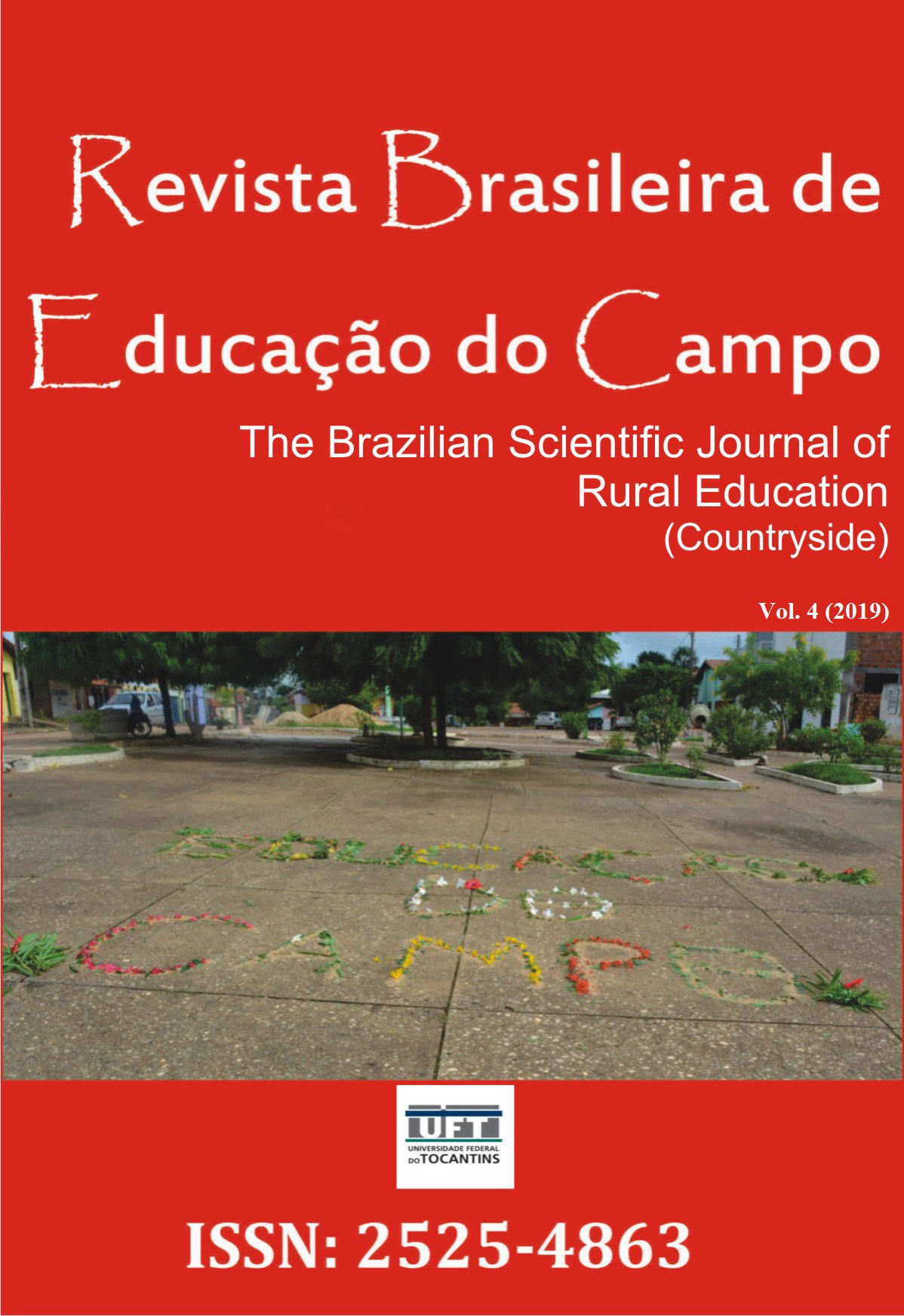Alternance notebook as instrument of registration, evaluation and teacher training
DOI:
https://doi.org/10.20873/uft.rbec.e6843Keywords:
Alternance Notebook; write; teacher trainingAbstract
The Universidade Federal do Pampa, Rio Grande do Sul, in the year 2014, started to offer the Rural Education Licentiate Course, which organizes its schedule in Alternance, in two complementary times: University Time and Community Time. In view of these two times it was proposed to use the Alternance Notebook as an instrument for recording and reflecting on the experiences and practices that are part of and influence the training process of the graduates. The research presented in this article aims to understand the contributions of the Alternance Notebook for the teacher training of these students. Participants in the investigation were graduates of the eighth semester of the course through a questionnaire that was about their experiences with the Alternance Notebook. The methodological path chosen for the analysis of the questionnaire responses was the Qualitative Textual Analysis that enabled the construction of the metatext "the field in writing flowers". Considering that personal and professional development are interrelated, the reflection provided by writing in these Notebook represents privileged action in the formative process.
Downloads
References
Andrade, F. L. C. D; & Almeida, P. V. (2018). Diários Reflexivos: Um Instrumento Relevante no Processo de Transformação e Desenvolvimento Profissional do Docente. Revista Educação e Linguagens, 7(12), 94-106. Recuperado em 12 de setembro de 2018, de: http://www.fecilcam.br/revista/index.php/educacaoelinguagens/article/viewFile/1628/1118
Baptistella, B. F., & Chaluh, L. N. (2017). O que se escreve na formação docente: um inventário das escritas de futuros professores. Revista Tempos e Espaços em Educação, 10(23), 235-248. Doi: http://dx.doi.org/10.20952/revtee.v10i23.6484
Brasil. (2006). Parecer CNE/CEB nº 1/2006. Dias letivos para a aplicação da Pedagogia de Alternância nos Centros Familiares de Formação por Alternância (CEFFA). Recuperado em 01 out 2019 de: http://pronacampo.mec.gov.br/images/pdf/mn_parecer_1_de_1_de_fevereiro_de_2006.pdf
Dattein, R. W., Güllich, R. I. C., & Zanon, L. B. (2018). Escritas reflexivas compartilhadas como estratégia de formação inicial: a pesquisa no ensino e na iniciação à docência em ciências. Ensino & Pesquisa, 16(1), 202-228. Recuperado em 29 de setembro de 2018, de: http://periodicos.unespar.edu.br/index.php/ensinoepesquisa/article/view/1640
Fernandes, R. S. (2015). A formação do professor-pesquisador-reflexivo: os registros da prática como dispositivos de subjetivação. Horizontes, 33(1), 73-84. Doi: https://doi.org/10.24933/horizontes.v33i1.100
Marques, M. O. (2006). Escrever é preciso: o princípio da pesquisa. Ijuí: Ed. Unijuí.
Minayo, M. C. S. (2012). Análise qualitativa: teoria, passos e fidedignidade. Ciência & Saúde Coletiva, 17(3), 621-626. Doi: http://dx.doi.org/10.1590/S1413-81232012000300007
Molina, M. C. (2015). Expansão das licenciaturas em Educação do Campo: desafios e potencialidades. Educar em Revista, (55), 145-166. DOI: http://dx.doi.org/10.1590/0104-4060.39849
Moraes, R. (2003). Tempestade de Luz: a compreensão possibilitada pela análise textual discursiva. Análise de conteúdo. Revista Ciência e Educação, 22(37), 07-32. Doi: http://dx.doi.org/10.1590/S1516-73132003000200004
Moreira, L. S.; & Moura, A. C. O. S. (2018). Escrever como Ação Formativa: Registros do Estágio de Observação na Licenciatura em Educação do Campo. Revista Educação – UNG, 13(2), 67-76. Recuperado em 08 de janeiro de 2019, de http://revistas.ung.br/index.php/educacao/article/view/3439/2528
Piatti, C. B. (2014). Pedagogia da alternância: espaços e tempos educativos na apropriação da cultura. Boletim GEPEP, 3(5), 48-64. Recuperado em 26 de setembro de 2018, de: http://www2.fct.unesp.br/grupos/gepep/3e.pdf
Prado, G. V. T., & Soligo, R. A. (2007). Memorial de formação: quando as memórias narram a história da formação. In Prado, G. G., & Soligo, R. (Orgs.). Porque escrever é fazer história: revelações, subversões, superações (pp. 45-60). 2. ed. Campinas, SP: Alínea.
Santos, P. P. (2005). Por que as pessoas têm dificuldade em escrever? — reflexões sobre a limitação repertorial e cognitiva da sociedade contemporânea. Revista Investigações, 18(2), 1-12. Recuperado em 05 de outubro de 2018, de: https://periodicos.ufpe.br/revistas/INV/article/view/1480
Saul, T. S., Rodrigues, R. A., & Auler, N. M. F. (2019). A Pedagogia da Alternância nas licenciaturas em Educação do Campo: olhar sobre as produções acadêmicas. Revista Brasileira de Educação do Campo, 4, e5541. Doi: https://doi.org/10.20873/uft.rbec.v4e5541
UNIPAMPA. (2016). Projeto Pedagógico do Curso de Licenciatura em Educação do Campo. Dom Pedrito: UNIPAMPA. Recuperado em 02 abril de 2018, de: http://dspace.unipampa.edu.br/bitstream/riu/111/3/PPC_Educa%C3%A7%C3%A3o%20do%20Campo.pdf
UNIPAMPA. (2013). Projeto Pedagógico do Curso de Licenciatura em Educação do Campo. Dom Pedrito: UNIPAMPA. Recuperado em 02 abril de 2018, de: http://dspace.unipampa.edu.br/bitstream/riu/111/1/PPC%20Educa%C3%A7%C3%A3o%20do%20Campo_Dom%20Pedrito_set%202013.pdf
Published
How to Cite
Issue
Section
License
Proposal for Copyright Notice Creative Commons
1. Policy Proposal to Open Access Journals
Authors who publish with this journal agree to the following terms:
A. Authors retain copyright and grant the journal right of first publication with the work simultaneously licensed under the Creative Commons Attribution License that allows sharing the work with recognition of its initial publication in this journal.
B. Authors are able to take on additional contracts separately, non-exclusive distribution of the version of the paper published in this journal (ex .: publish in institutional repository or as a book), with an acknowledgment of its initial publication in this journal.
C. Authors are permitted and encouraged to post their work online (eg .: in institutional repositories or on their website) at any point before or during the editorial process, as it can lead to productive exchanges, as well as increase the impact and the citation of published work (See the Effect of Open Access).















